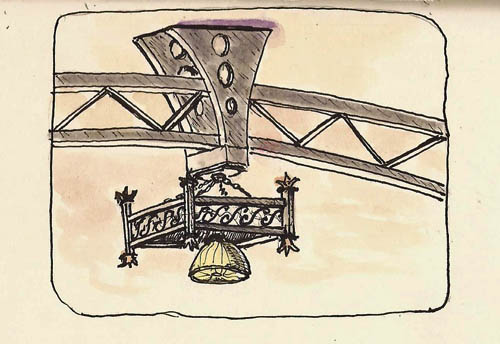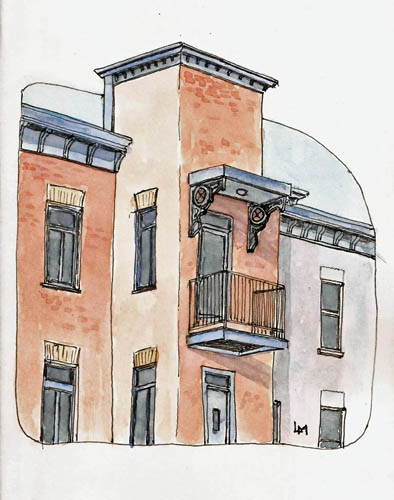One thing that many of us who sketch on location talk about is how much easier it is to fit sketching into a busy schedule. We contrast it to creating fine art and the need for large blocks of time. We emphasize the point by quoting the many laments from fine artists about not having time to do their art.
There is truth to our claim but, on some level we exaggerate, as when many of us sketch a complex scene, or simply a sketch with lots of detail, we can burn away a couple hours without problem, and many a fine art piece is created in the same amount of time.
But, nevertheless, what we say is true. I sketch almost every day, often more than once a day. Unless you’re making your living as a fine artist, few could make that claim. As I look at what I do and how I do it, I see that there is a ‘trick’ to fitting sketching into a busy schedule, whether it be by wandering the city as a street sketcher or sitting at home doing sketching at the kitchen table. For lack of a term for this trick, I’ll call it time-result flexibility.
I learned this concept from Yvan Breton, the guy who has taught me more than anyone else about drawing. What amazes me about Yvan is his ability to do 30-second sketches, 2-minute sketches, 20-minute sketches, 2-hour sketches, and pieces of fine art requiring multiple sessions and many hours. I guess, to be more precise, it isn’t being able to draw something over differing periods of time as any drawing book will talk about doing gesture sketches, contour sketches, and various forms of more detailed art.
What is impressive about Yvan is that he does this seamlessly, magically fitting a true, realistic sketch into each of these time frames. He has developed the ability to assess his available time and approach and develop his sketch such that, as the wizard Gandalf said in Lord of the Rings, “arrives exactly when he means to” and his sketches are complete. Short time periods, of course, have less detail. Maybe one could argue that they are less precise, but it’s really hard to tell and, to me, that is downright magical.
And while some sketchers fit sketching into their busy schedules by always sketching quickly, I encourage those interested in fine art to consider this alternative approach – adjusting the result of your sketch to the time available for it. This does require adjusting your expectations to time frame but it goes deeper than that. It means being able to identify and prioritize the various aspects of what you’re drawing and organizing your approach to capture the high priority things, in a quick sketch, adding a few more if you have a longer time and only capturing everything when you have an unlimited amount of time.
I know..I know…this is simply restating “just simplify” but that’s not what I’m talking about. We can talk about ‘keep it loose’ til the cows come home but loose is a different debate entirely. Yvan can do this time-result trick with portraits and each of them will look LIKE the person he’s drawing.
I wish I could better describe his thoughts and actions as if I could understand and do it well myself, I might better use words to explain it. I cannot, but it is something that we can all think about and with practice implement in your own work. The first step is to think about the time-result equation as you sketch.
The next step, I’m convinced, is to start drawing in radically different time frames. I was resistant to this idea, mostly because I couldn’t do it. The thought of drawing anything in 30 seconds was beyond my abilities. Heck, the thought of drawing anything in 20 minutes was beyond my abilities until I’d drawn a few hundred things that took 1-2 hours. But you’re all more experienced than I am, right? So give it a try.
Here are my attempts at this sort of thing, all done within the last week or so. The first is a very quick sketch of a friend. I spent about 30-seconds capturing his shape, and little more, as he was talking to someone.
Is it great art? Nope, but I can look at it and remember that day. I also got some practice capturing a shape quickly. I got to do art while I waited for him. I had fun. I’m just guessing but if I do another 120 of these I bet my ability to do it will improve. What do you think? And how long will that take to do 120 sketches like this? In real sketching time, ONE HOUR, and it will be one hour spent drawing instead of just standing around. Everyone has ‘dead time’ in their life.
I was out to lunch with a friend and afterwards he had to stop at a store, run in, and pick something up. I sat in the car for 3-4 minutes. As I sat I realized there was a building before me so I got out my small sketchbook and started drawing. I spent 2-3 minutes on this sketch before my buddy returned and I quickly slapped on some color before scanning it. I could have just sat and watched cars drive by but what fun would that be? Doing 100 of these sketches would require seven hours of waiting for people, sitting in a doctor’s office, waiting for lunch to be served. Sadly, we all spend lots of time doing nothing. And again, the result is fun and I get more experience “seeing” things and recording them. If you did one of them a day, you’d have 365 sketches like this at the end of the year.
I was in a mall, again… waiting. I looked up and noticed the large light fixtures that light the mall corridors. I’d been in the mall a gazillion times but never noticed them before. Again, I got out my sketchbook and spent 10-12 minutes drawing one of those lights. I found it something of a challenge as I always have trouble with angles when I have to look up a lot. In the end, though, the waiting became fun and productive.
When I have more time, but not enough for a complex scene, I’ll do something like this:
Which one do you like best? Yeah…me too, but those quicker, more spartan sketches allow me to build the ability to do the sketch above in about half an hour.
And when I have a lot of time, I’ll do something like this:
 I can’t tell you how long this sketch took me except to say that I need a significant block of time to do a sketch like this. If I only did sketches like this I would have a lot less fun, a lot less often, and I’d have a lot less experience in laying line to paper than I currently have. The time-result ‘trick’ is working for me. My results are not up to what Yvan can produce in a few minutes but if I’m convinced that working in different time frames, fitting in as much drawing as I possibly can into my life, I will improve. Maybe it can help you as well.
I can’t tell you how long this sketch took me except to say that I need a significant block of time to do a sketch like this. If I only did sketches like this I would have a lot less fun, a lot less often, and I’d have a lot less experience in laying line to paper than I currently have. The time-result ‘trick’ is working for me. My results are not up to what Yvan can produce in a few minutes but if I’m convinced that working in different time frames, fitting in as much drawing as I possibly can into my life, I will improve. Maybe it can help you as well.




